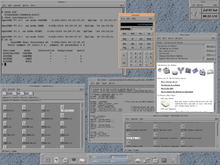- Common Desktop Environment
-
Common Desktop Environment 

DECwindows CDE on OpenVMS 7.3-1Developer(s) The Open Group Operating system Unix, OpenVMS Type Desktop environment License Proprietary Website www.opengroup.org/cde The Common Desktop Environment (CDE) is a desktop environment for Unix and OpenVMS, based on the Motif widget toolkit.
Contents
History
Corporate history
SunSoft, HP, IBM and USL announced CDE in June 1993 as a joint development within the Common Open Software Environment (COSE) initiative. The primary environment was based on HP's VUE (Visual User Environment), itself derived from the Motif Window Manager (mwm). IBM contributed its Common User Access model and Workplace Shell. Novell provided desktop manager components and scalable systems technologies from UNIX System V. Sun contributed its ToolTalk application interaction framework and a port of its DeskSet productivity tools, including mail and calendar clients, from its OpenWindows environment.[1]
In March 1994 CDE became the responsibility of the "new OSF", a merger of the Open Software Foundation and Unix International;[2] in September 1995, the merger of Motif and CDE into a single project, CDE/Motif, was announced.[3] OSF became part of the newly formed Open Group in 1996.[4]
Until about 2000, users of Unix desktops regarded CDE as the de facto standard, but at that time, other desktop environments such as GNOME and KDE were quickly becoming mature, and became almost universal on the Linux platform, which already had a larger user base than most commercial Unixes in total.[citation needed] Red Hat is the only Linux distribution to which CDE has been ported, although it has since been phased out in favour of GNOME. However CDE code can still be bought and compiled on any UNIX or UNIX-like OS.
In 2001, Sun Microsystems announced that they would phase out CDE as the standard Solaris desktop environment in favor of GNOME. Solaris 10, released in early 2005, includes both CDE and the GNOME-based Java Desktop System. Future releases of Solaris will be based on the OpenSolaris open source project, which states that there is no plan to make the Solaris CDE "consolidation" (OS component) available as open source.[5]
HP's OpenVMS uses CDE as its standard desktop environment.
The Open Group released Motif in 2000 as OpenMotif under a "revenue sharing" license that does not fully meet either the open source or free software definitions. (The Open Group had wished to make it open source, but did not quite succeed in achieving this.[6]) In 2006, a petition was created asking The Open Group to release the source code for CDE and Motif under a free license.[7]
The Xfce desktop at one time took part of its look and feel from the CDE environment, but no longer does.
OpenCDE, an open source project to replicate CDE, was started in early 2010. The project intends to reproduce the look and feel, organization, and feature set of CDE without using any CDE-derived code.[8]
Version history
Operating systems using CDE
- AIX (IBM)
- Digital UNIX / Tru64 UNIX (originally Digital Equipment Corporation, now Hewlett-Packard)
- HP-UX (Hewlett-Packard)
- OpenVMS (originally Digital Equipment Corporation, now Hewlett-Packard)
- Solaris (Sun Microsystems)
- UnixWare (Univel)
- IRIX (For a short time Silicon Graphics offered CDE as an alternative to IID[citation needed])
References
- ^ "UNIX Leaders Complete First Release of Specification for Common Open Software Environment Desktop" (Press release). Hewlett-Packard, IBM Corporation, SunSoft, Inc., UNIX System Laboratories, X/Open Company Ltd.. 1993-06-30. http://bubl.ac.uk/ARCHIVE/subject/computing/misc/coseup6.htm. Retrieved 2007-11-30.
- ^ "Leading Vendors Unify to Accelerate Open Systems" (Press release). AT&T Global Information Systems, Digital Equipment Corporation, Hewlett-Packard Company, IBM Corporation, SunSoft Incorporated, et al.. 1994-03-23. http://groups.google.com/group/comp.unix.osf.misc/msg/4ebc895ff10823f1. Retrieved 2008-05-15.
- ^ "OSF Announces Formal Launch of CDE/Motif Project" (Press release). Open Software Foundation. 1995-09-07. http://groups.google.com/group/cu.motif-talk/msg/9935c0cb91e254fd. Retrieved 2008-05-15.
- ^ "X/Open and OSF Join to Create The Open Group" (Press release). X/Open Company Ltd. Open Software Foundation. 1996-02-14. http://www.rdg.opengroup.org/public/news/feb96/merge.htm. Retrieved 2008-05-16.
- ^ "OpenSolaris Consolidation Information". OpenSolaris Web site. http://www.opensolaris.org/os/about/roadmap/conslist/. Retrieved 2007-12-01.
- ^ "Open Motif Frequently Asked Questions". The Open Group. 2004-07-13. http://www.opengroup.org/openmotif/faq.html. Retrieved 2007-11-30.
- ^ Peter Howkins. "Petition to Open Source CDE and Motif". http://www.marutan.net/cde/. Retrieved 2007-11-30.
- ^ kpedersen. "OpenCDE". http://www.opencde.org. Retrieved 2011-02-14.
External links
- AIX - CDE at the Wayback Machine
- HP-UX - CDE
- Solaris - CDE
- Tutorial for the CDE
- Open Group - CDE
Desktop environments and window managers for X11 DEs Full-featuredGNOME • KDE Software CompilationMid-rangeCDE • IRIX Interactive Desktop • XfceLightweightShellUnity • GNOME Shell • KDE PlasmaWMs Full-featuredLightweightMinimalisticStandards of The Open Group Categories:- Desktop environments
- X window managers
- OpenVMS
- Sun Microsystems software
Wikimedia Foundation. 2010.
